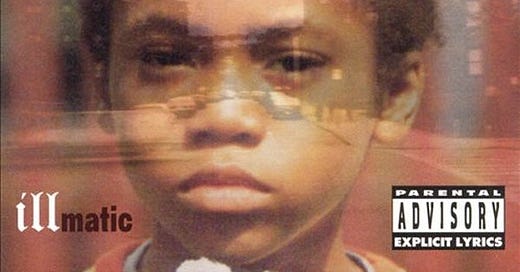I drink Moët with Medusa, give her shotguns in Hell
Nas - 'It Ain't Hard To Tell' (Illmatic - 1994)
Welcome to June and the 1990s month here on The Run Out Grooves. As we move into the era of the CD, we will be looking at eight albums from that period, starting today with Nas, who will be joined by A Tribe Called Quest, The Cocteau Twins, Mercury Rev, Nine Inch Nails, R.E.M., Ride and Suede.
"It Ain't Hard to Tell" is one of the rarer types of song we feature on The Run Out Grooves in that it was also a single. The song by Nas, from his debut studio album Illmatic released in 1994 and one that people refer to as hip-hop’s Sergeant Pepper’s Lonely Hearts Club Band in a non-ironic way.1
Nas, or Nasir Jones to friends and family, recorded the song at Battery Studios in New York, one of the album’s recordings main locations. Like the first single, ‘Halftime’, Nas wrote the lyrics, and Large Professor2 handled the production. The song is a textbook example of what Nas does so well across Illmatic, touching on themes of life out in the streets, social consciousness and ambition, and executing complex and vivid imagery through wordplay. - most famously on ‘NY State of Mind’ where one might assume that “I never sleep, 'cause sleep is the cousin of death” has been lifted from a Shakespeare play.
One of the song's most famous elements is the samples it uses - the drums from Stanley Clarke’s ‘Slow Dance’ and Kool & The Gang’s ‘NT’ are there, but more prominent is the sample of Michael Jackson’s ‘Human Nature’ from Thriller.
We did the original version in Large Professor’s apartment. And once there was a deal in place, we were able to use a real mic and a real studio [to re-record]. After me, SWV did “Right Here” with the same sample [from Michael Jackson’s “Human Nature”]. I felt like I was responsible for that record, but the reality is that “Human Nature” was such a beautiful-a** song that people wanted to replay that. When the SWV record came out, I was p*ssed because if I was to have a record for the radio, that was the perfect one. And when SWV took the shine, it was like, “Oh no!” Of course, it was my first album. I was like, Wait, how am I gonna get Michael Jackson to clear this? And then I realized, Oh sh*t, we’re label mates! So we made it happen.
These samples give the song a bedrock on which Nas performs his intricate rhymes. Large Professor looped the song's melodic hook and pitched it up to create a dreamy, almost ethereal backdrop already prevalent in the original track.
This choice of sample works remarkably well, as the underlying optimism of the melody contrasts and complements the gritty street narratives in Nas's verses. It is hard to think of another person less street tough than Jackson singing ‘Human Nature’ despite the attempts of the videos of ‘Bad’ and ‘Smooth Criminal’ to convince you otherwise.
As the final track on the album, ‘It Ain’t Hard To Tell’ works as a bookend to the world that Nas has spun out in the previous 35 minutes. A closing statement full of complex and diligent wordplay as well as powerful storytelling that outlines why the album is seen as such a landmark release.
The song and album set a high bar, which Nas has arguably never hurdled. A move to conceptual cohesiveness on later albums was aligned with the deft lyrical prowess and social awareness. Still, there would be more experimentation with production styles and themes on the likes of It Was Written and 2001’s Stillmatic.
Illmatic was released towards the end of the significant period in hip hop, often referred to as a Golden Age. This era, roughly from the late 1980s to the mid-1990s, was characterised by its diversity, quality, innovation, and influence. Illmatic is one of the set texts for anyone interested in this period alongside others.3
The album was rightly praised for its poetic lyricism, complex rhymes, and gritty depiction of life in New York City, especially in the Queensbridge housing projects where Nas grew up. This authentic and raw portrayal of urban life significantly influenced the genre, setting a standard for lyrical depth and realism in hip-hop and closing with Nas himself sharing with us the idea that what he has been schooling us on could see him locked away as his rhymes are either too dangerous to be out in public or so valuable that they need to be locked up in a vault.
Of course, any list of Hip-hop’s answers to Sgt Pepper ends up being a list of Hip-hop albums that are considered the best.
Also known as Large Pro and Extra P - William Paul Mitchell.
We’ve previously featured It Takes A Nation Of Millions…, 3ft High and Rising, Enter The Wu-Tang Clan (36 Chambers) and Straight Outta Compton from this period.




